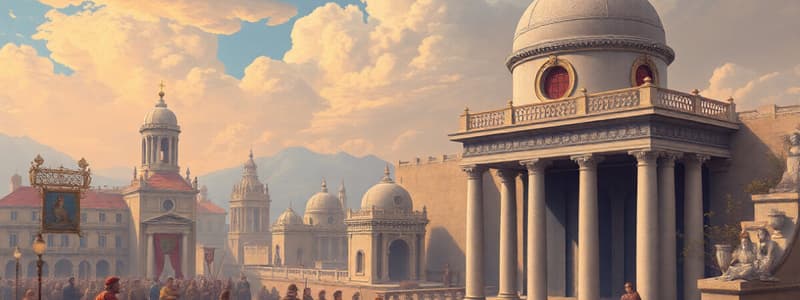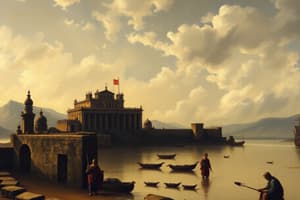Podcast
Questions and Answers
What led to the establishment of the Roman Republic?
What led to the establishment of the Roman Republic?
- The assassination of Julius Caesar
- A victory in the Punic Wars
- A peaceful transition of power
- The overthrow of the last Roman king (correct)
The Punic Wars were fought between Rome and Greece.
The Punic Wars were fought between Rome and Greece.
False (B)
What was the primary goal of both Rome and Carthage during the Punic Wars?
What was the primary goal of both Rome and Carthage during the Punic Wars?
To dominate trade routes across the Mediterranean Sea
The Carthaginian general who crossed the Alps with elephants was named ______.
The Carthaginian general who crossed the Alps with elephants was named ______.
The Phoenicians who founded Carthage were known to the Romans as:
The Phoenicians who founded Carthage were known to the Romans as:
The First Punic War concluded with a decisive Carthaginian victory.
The First Punic War concluded with a decisive Carthaginian victory.
In what modern-day country was Carthage located?
In what modern-day country was Carthage located?
How many major conflicts make up the Punic Wars?
How many major conflicts make up the Punic Wars?
The First Punic War began in the year ______.
The First Punic War began in the year ______.
Match the following events with their descriptions:
Match the following events with their descriptions:
What was a consequence of Roman soldiers serving far from home during the Punic Wars?
What was a consequence of Roman soldiers serving far from home during the Punic Wars?
The Optimates represented the interests of the lower classes in the Roman Republic.
The Optimates represented the interests of the lower classes in the Roman Republic.
Who benefited from soldiers being away from home during the Punic Wars?
Who benefited from soldiers being away from home during the Punic Wars?
During the Punic Wars, Roman soldiers were often away from home for more than a ______.
During the Punic Wars, Roman soldiers were often away from home for more than a ______.
Match the political groups in the Roman Republic with their described interests:
Match the political groups in the Roman Republic with their described interests:
What was the main reason Roman soldiers' families sold their farms?
What was the main reason Roman soldiers' families sold their farms?
Caius Marius was a leader of the Optimates.
Caius Marius was a leader of the Optimates.
Name one of the two political parties that emerged during this period of the Roman Republic.
Name one of the two political parties that emerged during this period of the Roman Republic.
The Punic Wars were fought between the Roman Republic and the ________ Empire.
The Punic Wars were fought between the Roman Republic and the ________ Empire.
Which of the following locations was part of the Carthaginian Empire during the Punic Wars?
Which of the following locations was part of the Carthaginian Empire during the Punic Wars?
Who began rewarding soldiers with land in exchange for military service?
Who began rewarding soldiers with land in exchange for military service?
A civil war is when two different countries fight against each other.
A civil war is when two different countries fight against each other.
In what year did Julius Caesar become dictator for life?
In what year did Julius Caesar become dictator for life?
Caesar famously declared 'Give the people ______ and games and they will be happy'.
Caesar famously declared 'Give the people ______ and games and they will be happy'.
Match the proverb with its meaning:
Match the proverb with its meaning:
What did Caesar do to gain popularity with his soldiers and the Roman people?
What did Caesar do to gain popularity with his soldiers and the Roman people?
What was Octavian's official title after becoming the first Roman Emperor?
What was Octavian's official title after becoming the first Roman Emperor?
Julius Caesar was murdered by a group of senators including his friend Marcus Junius Brutus.
Julius Caesar was murdered by a group of senators including his friend Marcus Junius Brutus.
Octavian was appointed as Caesar's successor after Caesar's death.
Octavian was appointed as Caesar's successor after Caesar's death.
Who did Octavian fight a civil war against to become the sole ruler of Rome?
Who did Octavian fight a civil war against to become the sole ruler of Rome?
What was the name of Caesar's son with Cleopatra?
What was the name of Caesar's son with Cleopatra?
According to Suetonius, Caesar's last words were in ______
According to Suetonius, Caesar's last words were in ______
Octavian claimed he wanted to restore the ________.
Octavian claimed he wanted to restore the ________.
Which of the following was NOT a title that Augustus strategically accepted to gain power?
Which of the following was NOT a title that Augustus strategically accepted to gain power?
In what modern-day country was Gaul, where Caesar lead legions?
In what modern-day country was Gaul, where Caesar lead legions?
Roman society rejected Greek styles of art and culture.
Roman society rejected Greek styles of art and culture.
What material did Emperor Augustus prefer to use when building temples and forums?
What material did Emperor Augustus prefer to use when building temples and forums?
Roman victories over Carthage and Greece led to the expansion of Rome throughout the __________.
Roman victories over Carthage and Greece led to the expansion of Rome throughout the __________.
Match the following Roman groups/figures with their roles or actions:
Match the following Roman groups/figures with their roles or actions:
What was a consequence of Roman soldiers being away from home for extended periods of time?
What was a consequence of Roman soldiers being away from home for extended periods of time?
Flashcards
End of Roman Monarchy
End of Roman Monarchy
The final ruler of Rome was overthrown, leading to the establishment of a new form of government: a republic, where senators and consuls made decisions.
Roman Expansion in Italy
Roman Expansion in Italy
The republic's powerful military allowed them to expand their territory throughout Italy, demonstrating their growing strength.
The Punic Wars
The Punic Wars
The Punic Wars were a series of three major conflicts between Rome and Carthage, two powerful city-states vying for control of important trade routes in the Mediterranean Sea.
Carthage: City-State Rival of Rome
Carthage: City-State Rival of Rome
Signup and view all the flashcards
First Punic War
First Punic War
Signup and view all the flashcards
Hannibal's Surprise Attack
Hannibal's Surprise Attack
Signup and view all the flashcards
Roman Response to Hannibal
Roman Response to Hannibal
Signup and view all the flashcards
The Third Punic War and Carthage's Fall
The Third Punic War and Carthage's Fall
Signup and view all the flashcards
The Punic Wars: Significance
The Punic Wars: Significance
Signup and view all the flashcards
Rise of the Roman Empire
Rise of the Roman Empire
Signup and view all the flashcards
Optimates
Optimates
Signup and view all the flashcards
Populares
Populares
Signup and view all the flashcards
Caius Marius
Caius Marius
Signup and view all the flashcards
Land Acquisition by Patricians
Land Acquisition by Patricians
Signup and view all the flashcards
The Struggle for Power
The Struggle for Power
Signup and view all the flashcards
Prolonged Military Service
Prolonged Military Service
Signup and view all the flashcards
Julius Caesar
Julius Caesar
Signup and view all the flashcards
Carthage
Carthage
Signup and view all the flashcards
Land Acquired During Military Campaigns
Land Acquired During Military Campaigns
Signup and view all the flashcards
What is a civil war?
What is a civil war?
Signup and view all the flashcards
Who is an 'Optimate'?
Who is an 'Optimate'?
Signup and view all the flashcards
Who is a 'Populare?'
Who is a 'Populare?'
Signup and view all the flashcards
Who is Julius Caesar?
Who is Julius Caesar?
Signup and view all the flashcards
Who is Marius?
Who is Marius?
Signup and view all the flashcards
What did Caesar say about bread and games?
What did Caesar say about bread and games?
Signup and view all the flashcards
Who killed Julius Caesar?
Who killed Julius Caesar?
Signup and view all the flashcards
What were Julius Caesar's last words?
What were Julius Caesar's last words?
Signup and view all the flashcards
What is the proverb 'Rome wasn't built in a day' about?
What is the proverb 'Rome wasn't built in a day' about?
Signup and view all the flashcards
What does the proverb 'All roads lead to Rome' mean?
What does the proverb 'All roads lead to Rome' mean?
Signup and view all the flashcards
Who was Augustus?
Who was Augustus?
Signup and view all the flashcards
How did Octavian become the sole ruler?
How did Octavian become the sole ruler?
Signup and view all the flashcards
How did Octavian gain power?
How did Octavian gain power?
Signup and view all the flashcards
Why was Octavian renamed Augustus?
Why was Octavian renamed Augustus?
Signup and view all the flashcards
How did Roman conquests impact the Roman Empire?
How did Roman conquests impact the Roman Empire?
Signup and view all the flashcards
How did Greek culture influence Roman society?
How did Greek culture influence Roman society?
Signup and view all the flashcards
How did Augustus improve the city of Rome?
How did Augustus improve the city of Rome?
Signup and view all the flashcards
What were the consequences of Roman expansion?
What were the consequences of Roman expansion?
Signup and view all the flashcards
What were the societal problems caused by Roman expansion?
What were the societal problems caused by Roman expansion?
Signup and view all the flashcards
What factors contributed to the rise of Julius Caesar?
What factors contributed to the rise of Julius Caesar?
Signup and view all the flashcards




